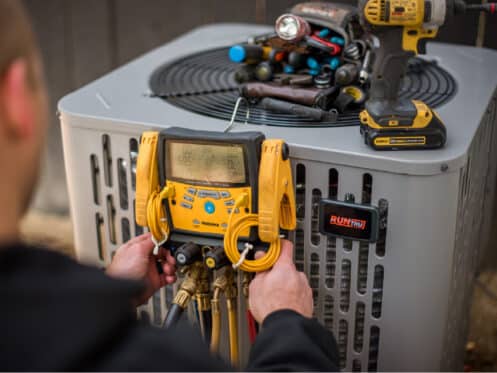The winter months bring exciting activities, such as holiday parties and temperature changes. Although winter can be an enjoyable season, you will need to make sure your HVAC system is ready to go. When temperatures fall, you will want an HVAC system that is in working condition. Fortunately, there are steps you can take to prepare your HVAC system for the winter months. By keeping the following tips in mind and scheduling routine maintenance with DeWolfe Plumbing, Heating & Cooling, you can make sure your HVAC system is prepared for the cold weather.
1. Change Air Filters
Your furnace works hard, and since it is responsible for distributing warm air throughout your home, you must make sure it remains in excellent condition. Simply put, a furnace works by pulling in cool outdoor air. The filtered air is then transferred toward the heat exchanger, which is then distributed by your ductwork. If your air filters are clogged or dirty from particulates in your home’s air, your system may struggle. These filters are created to keep the air you breathe comfortable and cool while keeping the furnace itself safe. If your filters are clogged with grime, dirt can blow into the cabinet of your furnace and reduce its efficiency. Furnace components, such as burners and igniters, are relatively delicate, and your system could shut down if too much dirt accumulates. Dirt accumulation can also result in short cycling. This means your furnace will be working harder to generate heat.
To prevent such problems, you should replace your system’s air filters regularly. Air filters should be replaced at least every 30 to 90 days (for most filters), but the amount of time between changes should depend on the type of filter you purchase. If you have pets or use your furnace frequently, you may need to change your filters more often. Before winter comes, change out your furnace’s filter. You should also replace your filter whenever it gets visibly dirty.
2. Update and Program Your Thermostat
When the time to warm your home arrives, be sure to update and check your thermostat’s programming. Sometimes, families realize their ambient temperature varies greatly between winter and summer, so it may be necessary to update the system. Here are some tips for adjusting your thermostat during winter:
To adjust your thermostat, set the thermostat to AUTO instead of ON. This will allow your blower motor to run excessively, which can waste energy. When you enable the AUTO setting, your blower will only turn on during heating cycles.
Next, choose a comfortable and energy-efficient temperature when programming your thermostat. When your family is home, consider adjusting your thermostat to 68 degrees for maximum efficiency.
When your family is away at school or work, reduce the temperature by 10 to 15 degrees for up to eight hours at a time. This can reduce your overall energy consumption and reduce the amount of time your furnace runs.
3. Check Your Outdoor Equipment
Air conditioners and heat pumps have an outdoor unit that needs routine care. Here are some ways to keep your outdoor unit in excellent condition during one of their busiest seasons:
Brush leaves off your outdoor HVAC unit with a soft broom. Be sure any twigs or grass clippings are removed from the fins of your outdoor unit.
Examine your rain gutters and downspouts near your outdoor air conditioner or heat pump and clear them if necessary. If debris blocks your gutters, they can accumulate water that may cover your unit. If this water freezes into a layer of ice, your heat pump won’t be able to easily absorb heat.
You don’t want your AC unit to unintentionally turn on during the winter. You can prevent this from happening by turning it off at the source. AC units have manual breakers that allow you to turn them on or off. The breaker is usually located near your unit’s power and refrigerant lines. Be sure there is at least 2 feet between your outdoor AC unit or heat pump and other items.
4. Test Your Smoke and CO2 Sensors
You should test your CO2 and smoke sensors in your home to protect your family. Make sure this equipment works during the heating season by testing your alarms and replacing batteries. Use your sensor’s TEST button to see if the unit turns on. You should also replace your batteries every six months if your alarm chirps from time to time, you should replace the batteries immediately. Old CO2 detectors should be replaced every five to seven years, and smoke detectors should be changed out every 10 years.
5. Ensure Your Vents Are Open and Operational
Your home’s HVAC system serves as its respiratory system. To make sure it can inhale new air and exhale warm air into your home, you must be sure your air supplies are not blocked and your vents are not trapped. Closed vents can cause your furnace to short cycle or overheat, which will cause trapped air to put strain on your system and damage it.
To ensure your system’s airflow remains normal, you should check the louvers. If your vent covers use louvers, you may notice that yours close easily. If they are older, they may be more difficult to close. Make sure the louvers on your vent covers remain open, and replace any cover that doesn’t work. You should also inspect your home to ensure your vents are not obstructed by carpet, household rugs, and furniture.
6. Check Exposed Ductwork
Before winter arrives, remember to check any exposed ductwork for potential problems. Disjointed seams, rips in the metal, and gaps can allow heated air to collect in spaces where the heat can’t be used. These defects can also simultaneously pull in cold air, creating a significant energy efficiency problem and increasing your electricity bill. You don’t want this to happen, so you should check your ducts for any defects, and call a professional to seal them up if necessary.
7. Schedule a Professional HVAC Tune-Up
Scheduling routine HVAC inspections and tune-ups can prevent potential issues in the future. Many of these issues can damage your heat pump, boiler, or furnace, so if you discover any problems, you will want to address them immediately. Hiring an HVAC professional in a timely manner can solve your problems and prevent your furnace from incurring additional damage. A tune-up can also help you save money by ensuring your furnace operates at maximum efficiency. In short, if you notice any problems, schedule the repairs right away.
Speak With an HVAC Professional
Having an HVAC system that works during the winter months is necessary, especially since Massachusetts experiences harsh winters. At DeWolfe Plumbing, Heating & Cooling, we can help you keep your HVAC system operational and catch any potential problems before they can cause more damage. Contact us today to speak with an HVAC professional. We offer heating, cooling, and plumbing services to residents in West Boylston, MA.


